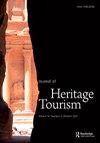Bonnie and Clyde’s extrajudicial killing: Gibsland, Louisiana’s dark tourism
IF 2.2
Q2 HOSPITALITY, LEISURE, SPORT & TOURISM
引用次数: 0
Abstract
ABSTRACT Discussing Gibsland, Louisiana’s Authentic Bonnie and Clyde Festival as dark tourism, this article asks whether the site of two peoples’ extrajudicial killing constitutes a dark tourist destination. Dark tourism is tourism associated with death. Gibsland is where Bonnie Parker and Clyde Barrow were ambushed, and extrajudicially killed, by a posse of law enforcement officers on 23 May 1934. Since 1993, there has been a festival in Gibsland commemorating the ambush, culminating in its reenactment. When Bonnie and Clyde’s bodies were displayed after the ambush, this demonstrated Foucault’s concept of punishment as a spectacle demonstrating the sovereign’s power to destroy those breaking the law and was an example of performative violence. When the actors pretending to be the dead Bonnie and Clyde pose after the reenactment, this demonstrates performed violence. When the spectators at the reenactment pose with the actors this demonstrates participation in punishment.邦妮和克莱德的法外杀戮:吉布斯兰,路易斯安那州的黑暗旅游
摘要本文将吉斯兰、路易斯安那州的“正宗邦妮和克莱德节”视为黑暗旅游,探讨两人法外杀人事件发生地是否构成黑暗旅游目的地。黑暗旅游是与死亡相关的旅游。1934年5月23日,邦尼·帕克和克莱德·巴罗在吉斯兰遭到一群执法人员的伏击,并被法外杀害。自1993年以来,吉斯兰一直有一个节日来纪念伏击事件,并最终重演。当邦妮和克莱德的尸体在伏击后被展示时,这表明福柯的惩罚概念是一种奇观,展示了君主摧毁违法者的权力,也是表演性暴力的一个例子。当演员们假扮死去的邦妮和克莱德在重演后摆出姿势时,这表明了表演的暴力。当观众在重演中与演员合影时,这表明他们参与了惩罚。
本文章由计算机程序翻译,如有差异,请以英文原文为准。
求助全文
约1分钟内获得全文
求助全文
来源期刊

Journal of Heritage Tourism
HOSPITALITY, LEISURE, SPORT & TOURISM-
CiteScore
6.50
自引率
11.10%
发文量
39
期刊介绍:
The Journal of Heritage Tourism ( JHT ) is a peer-reviewed, international transdisciplinary journal. JHT focuses on exploring the many facets of one of the most notable and widespread types of tourism. Heritage tourism is among the very oldest forms of travel. Activities such as visits to sites of historical importance, including built environments and urban areas, rural and agricultural landscapes, natural regions, locations where historic events occurred and places where interesting and significant living cultures dominate are all forms of heritage tourism. As such, this form of tourism dominates the industry in many parts of the world and involves millions of people. During the past 20 years, the study of tourism has become highly fragmented and specialised into various theme areas, or concentrations. Within this context, heritage tourism is one of the most commonly investigated forms of tourism, and hundreds of scholars and industry workers are involved in researching its dynamics and concepts. This academic attention has resulted in the publication of hundreds of refereed articles in various scholarly media, yet, until now there has been no journal devoted specifically to heritage tourism; Journal of Heritage Tourism was launched to fill this gap. JHT seeks to critically examine all aspects of heritage tourism. Some of the topics to be explored within the context of heritage tourism will include colonial heritage, commodification, interpretation, urban renewal, religious tourism, genealogy, patriotism, nostalgia, folklore, power, funding, contested heritage, historic sites, identity, industrial heritage, marketing, conservation, ethnicity, education and indigenous heritage.
 求助内容:
求助内容: 应助结果提醒方式:
应助结果提醒方式:


